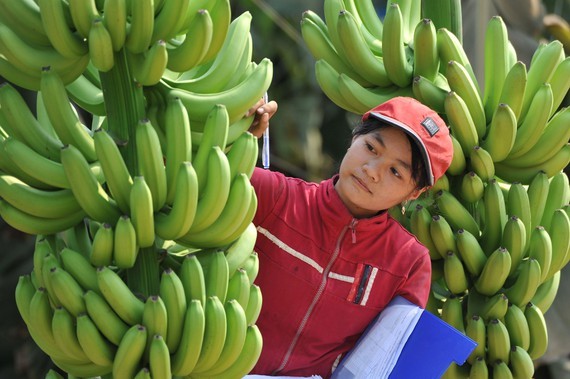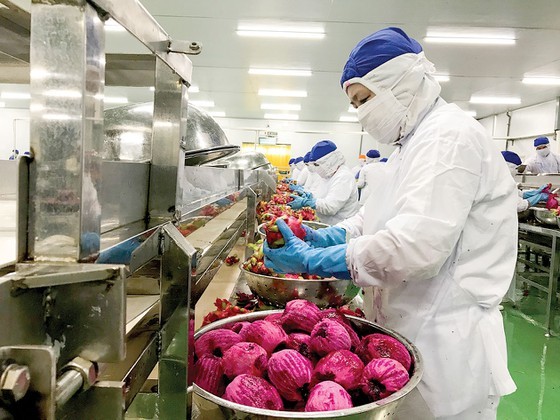 By-products from banana plants are used as forage for cows by Huy Long An Company. (Photo: SGGP)
By-products from banana plants are used as forage for cows by Huy Long An Company. (Photo: SGGP)
Polluting the environment
According to the Ministry of Agriculture and Rural Development (MARD), Vietnam has a large and diversified agricultural product output, meeting the consumption demand of about 100 million people and exporting to many countries worldwide. In the process of agricultural production, the proportion of by-products discharged from fisheries, plant cultivation, and livestock industries is extremely high. Data from the General Statistics Office shows that the total volume of agricultural by-products was over 156.8 million tons in 2020, including 88.9 million tons of by-products from plant cultivation, 61.4 million tons of livestock and poultry manure from the livestock industry, 5.5 million tons from the forestry industry, and nearly 1 million tons from aquaculture.
Mr. Tong Xuan Chinh, Deputy Director of the Department of Livestock Production under the MARD, said that post-harvest by-products of plant production included 42.8 million tons of rice straw, 10 million tons of corn stalks, 3.6 million tons of vegetables and fruits, 3.1 million tons of cassava stalks, 3.1 million tons of cashew fruits, and 6.1 million tons of others. These by-products have also been used as raw fodder for livestock, biological bedding, straw mushrooms, and cushioning for fruits by farmers, but only 50 percent of the total by-products are used. Only in the field of fisheries, up to 90 percent of by-products are utilized to process into useful products, such as animal feed and organic fertilizer. Many remaining agricultural by-products have become waste, causing serious environmental pollution.
Meanwhile, Prof.-Dr. Vo Tong Xuan, Principal of Nam Can Tho University, said that agricultural by-products are gold mines. For instance, Vietnam exports tuna to Japan, but this country only buys fish meat. Other parts, such as skin, organs, and bones, are processed into fertilizers and sold to Vietnamese farmers for plant cultivation. “Sadly, Vietnam can also process fertilizers from tuna by-products, but the prices are twice as high as those of imported Japanese products. The main reason is that Vietnam does not have advanced production technology and equipment to lower the cost prices," said Prof.-Dr. Vo Tong Xuan.
In fact, in Vietnam, many farmers and businesses have successfully taken advantage of agricultural by-products to serve their plant and livestock production. In Ben Tre Province, the 7-hectare farm owned by Ms. Nguyen Thi Thien, Director of Thai Hung Thinh Joint Stock Company, has used agricultural by-products to return to serve the farm itself. Her farm raises 500 pigs, and pig manure is composted and made biogas. Vegetables and organic waste are also used to produce organic fertilizers. Thanks to this utilization, the farm only spends VND50 million-VND70 million to buy chemical fertilizers to support the cultivation each year. And yet, according to Ms. Nguyen Thi Thien, Ben Tre Province has a huge output of coconut and durian, so her business has been researching ways to process durian shells, coconut shells, and coconut fronds into activated carbon and wood vinegar. Activated charcoal and wood vinegar help to kill pests on coconut trees.
Revenue of $4 billion-$5 billion per year
According to Deputy Minister of Agriculture and Rural Development Tran Thanh Nam, the potential for processing and reusing agricultural by-products in Vietnam can bring a value of up to $4 billion-$5 billion per year. However, the actual use of agricultural by-products is merely at about $275 million. For the agricultural by-products industry to develop, the State needs to have policies to attract enterprises to participate in the stage of collection, treatment, and processing and prioritize the production of products with added value. Agricultural by-products can create higher value, such as durian skins and mango seeds to produce bio-fertilizers; dragon fruit and banana peel to make colorants; pangasius fat used as medicines or feed ingredients in livestock; orange and grapefruit peel to make candied citrus peel.
According to the Ministry of Agriculture and Rural Development (MARD), Vietnam has a large and diversified agricultural product output, meeting the consumption demand of about 100 million people and exporting to many countries worldwide. In the process of agricultural production, the proportion of by-products discharged from fisheries, plant cultivation, and livestock industries is extremely high. Data from the General Statistics Office shows that the total volume of agricultural by-products was over 156.8 million tons in 2020, including 88.9 million tons of by-products from plant cultivation, 61.4 million tons of livestock and poultry manure from the livestock industry, 5.5 million tons from the forestry industry, and nearly 1 million tons from aquaculture.
Mr. Tong Xuan Chinh, Deputy Director of the Department of Livestock Production under the MARD, said that post-harvest by-products of plant production included 42.8 million tons of rice straw, 10 million tons of corn stalks, 3.6 million tons of vegetables and fruits, 3.1 million tons of cassava stalks, 3.1 million tons of cashew fruits, and 6.1 million tons of others. These by-products have also been used as raw fodder for livestock, biological bedding, straw mushrooms, and cushioning for fruits by farmers, but only 50 percent of the total by-products are used. Only in the field of fisheries, up to 90 percent of by-products are utilized to process into useful products, such as animal feed and organic fertilizer. Many remaining agricultural by-products have become waste, causing serious environmental pollution.
Meanwhile, Prof.-Dr. Vo Tong Xuan, Principal of Nam Can Tho University, said that agricultural by-products are gold mines. For instance, Vietnam exports tuna to Japan, but this country only buys fish meat. Other parts, such as skin, organs, and bones, are processed into fertilizers and sold to Vietnamese farmers for plant cultivation. “Sadly, Vietnam can also process fertilizers from tuna by-products, but the prices are twice as high as those of imported Japanese products. The main reason is that Vietnam does not have advanced production technology and equipment to lower the cost prices," said Prof.-Dr. Vo Tong Xuan.
In fact, in Vietnam, many farmers and businesses have successfully taken advantage of agricultural by-products to serve their plant and livestock production. In Ben Tre Province, the 7-hectare farm owned by Ms. Nguyen Thi Thien, Director of Thai Hung Thinh Joint Stock Company, has used agricultural by-products to return to serve the farm itself. Her farm raises 500 pigs, and pig manure is composted and made biogas. Vegetables and organic waste are also used to produce organic fertilizers. Thanks to this utilization, the farm only spends VND50 million-VND70 million to buy chemical fertilizers to support the cultivation each year. And yet, according to Ms. Nguyen Thi Thien, Ben Tre Province has a huge output of coconut and durian, so her business has been researching ways to process durian shells, coconut shells, and coconut fronds into activated carbon and wood vinegar. Activated charcoal and wood vinegar help to kill pests on coconut trees.
Revenue of $4 billion-$5 billion per year
According to Deputy Minister of Agriculture and Rural Development Tran Thanh Nam, the potential for processing and reusing agricultural by-products in Vietnam can bring a value of up to $4 billion-$5 billion per year. However, the actual use of agricultural by-products is merely at about $275 million. For the agricultural by-products industry to develop, the State needs to have policies to attract enterprises to participate in the stage of collection, treatment, and processing and prioritize the production of products with added value. Agricultural by-products can create higher value, such as durian skins and mango seeds to produce bio-fertilizers; dragon fruit and banana peel to make colorants; pangasius fat used as medicines or feed ingredients in livestock; orange and grapefruit peel to make candied citrus peel.
 Dragon fruit peel is used to make colorants. (Photo: SGGP)
Dragon fruit peel is used to make colorants. (Photo: SGGP)
The agricultural sector needs to determine that by-products are the output of agriculture, but they are the input to other sectors. The ministry will direct the National Agricultural Extension Center to develop a training program to guide farmers to use effectively agricultural by-products. The MARD always encourages businesses to put forward ideas and projects to make use of agricultural by-products. From a scientific and business perspective, the Vietnam Farms and Agricultural Enterprises Association advocates the policy of the MARD and adds that it requires the participation of many industries to process by-products into useful products, such as biotechnology, mechanics, and chemical industries, along with many policies to support investment and reduce import tax on modern machinery and processing lines. Enterprises and farmers must cooperate to deploy regional and national models to make full use of agricultural by-products. Besides, the MARD needs to issue national technical regulations for each field of agricultural by-product treatment so that investment enterprises will not face any obstacles in environmental impact assessments when building a by-product treatment plant. If all of these conditions are fulfilled, Vietnam will have been able to produce and supply most of the organic fertilizers and many other products for the domestic market by 2030, helping protect the environment and bringing economic efficiency from trading products made from agricultural by-products.
The MARD has just directed the Department of Livestock Production to develop a draft project for the development of the animal feed processing industry in the 2021-2030 period, in which the important solution is to take advantage of agricultural by-products to process animal feed.
























